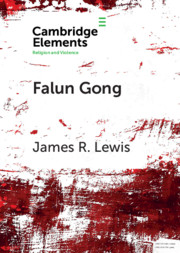Element contents
Falun Gong
Published online by Cambridge University Press: 28 March 2018
Summary
- Type
- Element
- Information
- Online ISBN: 9781108564557Publisher: Cambridge University PressPrint publication: 03 May 2018
References
References and Bibliography of English-Language Resources on Falun Gong
I began seriously researching Falun Gong in 2015. I was surprised to discover a truly significant quantity of relevant research materials in English. Without trying to be completely exhaustive, in this bibliography I have tried to bring together as many English-language academic sources on Falun Gong as I could find, whether I referred to them or not. I have also included the nonacademic sources to which I refer in different parts of the present volume. In addition to these sources, most of Li Hongzhi’s writings and lectures have been translated into English and posted online; I have only included those to which I have referred in the preceding pages. This does not count the extensive online writings by followers and supporters that also appear on movement websites.
For anyone who becomes seriously interested in this topic, there are currently a number of good scholarly monographs on Falun Gong in English. David A. Palmer’s Qigong Fever: Body, Science, and Utopia in China (New York: Columbia University Press, 2007) is essential reading for understanding the Qi Gong “boom” and the early Falun Gong movement in China prior to the 1999 crackdown. David Ownby’s Falun Gong and the Future of China (New York: Oxford University Press, 2008) is basically a good general treatment, despite what I regard as an overly trusting attitude toward practitioners (discussed in my Afterword). Benjamin Penny’s The Religion of Falun Gong (Chicago: University of Chicago Press, 2012) is exceptionally good on analyzing Falun Gong as a religion. Finally, James W. Tong’s Revenge of the Forbidden City: The Suppression of the Falungong in China, 1999–2005 (New York: Oxford University Press, 2009) is a detailed study of the suppression of the Falun Gong movement on the mainland. The most recent monograph-length study of which I am aware is Juha A. Vuori’s Critical Security and Chinese Politics: The Anti-Falun Gong Campaign (London: Routledge, 2014), which, as the title indicates, examines the PRC’s suppression of FLG in terms of critical security studies.

